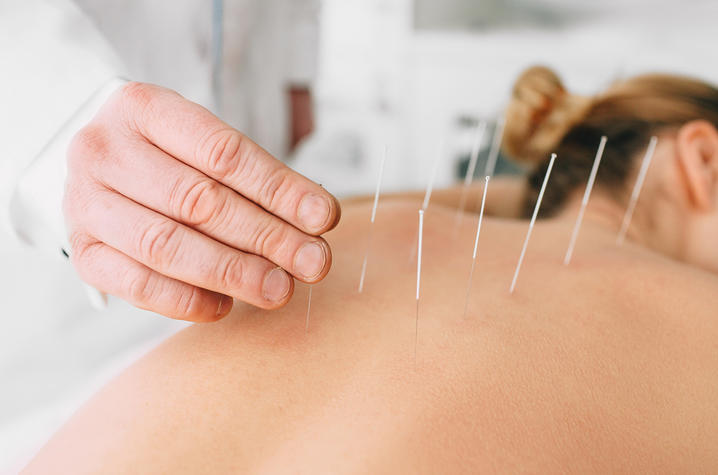Getting to the point: how acupuncture could benefit you

The University of Kentucky Public Relations & Strategic Communications Office provides a weekly health column available for use and reprint by news media. This week's column is by Dennis Kim and Norah Charles, licensed acupuncturists with UK HealthCare Integrative Medicine and Health.
LEXINGTON, Ky. (Aug. 16, 2023) — Acupuncture involves the insertion of needles on specific points of the body. In Eastern terminology, it helps stimulate the flow of chi, which is the life force, along the meridians of your body.
In Western terminology, it helps send nerve fibers to the spinal cord, brainstem, the hypothalamus and pituitary gland. These fibers help release neurotransmitters such as endorphins, the body's natural painkiller, along with enkephalins plus norepinephrine, which helps inhibit the nerve pain fibers to suppress pain.
Acupuncture is non-medication. If a patient is having a condition that is not responding to medication, they're not recovering fully with physical therapy or other kinds of therapy, we're sometimes able to make progress with them. We find that we get a lot of referrals from medical doctors who are trying to help patients, mostly with acute and chronic pain, find alternatives to medication.
The most common conditions that we treat with acupuncture in our clinic are musculoskeletal issues such as fibromyalgia, myofascial pain, carpal tunnel and arthritis. These, and other conditions that are treated here, involve neck pain, low back pain or any type of musculoskeletal issues.
The first session of acupuncture involves asking a lot of questions of the patient. Patients usually come in with a primary complaint and the acupuncturist needs details about what brought them into the clinic. The provider will usually go through questions involving other aspects of their health, such as health history, sleep, digestion and mood. This helps the provider develop a better diagnosis from the acupuncture perspective.
Another benefit of trying acupuncture is multiple conditions can be treated at once. If a patient presents with insomnia and also low back pain, those do not need to be separate treatments. We spend time talking with the patient at the beginning of the session to get an idea of what's going on with them in a whole health manner.
The acupuncture session only lasts for about 20 to 30 minutes with the needles in, and follow-up sessions are scheduled as needed.
Acupuncture is cumulative in its benefits. A patient who comes in with low back pain may notice relief after one session, but they will notice increased relief after more sessions. Everybody's body is different and it depends on the condition, but we ask patients to give acupuncture three sessions to see if we can make any headway with their condition.
UK HealthCare is the hospitals and clinics of the University of Kentucky. But it is so much more. It is more than 10,000 dedicated health care professionals committed to providing advanced subspecialty care for the most critically injured and ill patients from the Commonwealth and beyond. It also is the home of the state’s only National Cancer Institute (NCI)-designated Comprehensive Cancer Center, a Level IV Neonatal Intensive Care Unit that cares for the tiniest and sickest newborns and the region’s only Level 1 trauma center.
As an academic research institution, we are continuously pursuing the next generation of cures, treatments, protocols and policies. Our discoveries have the potential to change what’s medically possible within our lifetimes. Our educators and thought leaders are transforming the health care landscape as our six health professions colleges teach the next generation of doctors, nurses, pharmacists and other health care professionals, spreading the highest standards of care. UK HealthCare is the power of advanced medicine committed to creating a healthier Kentucky, now and for generations to come.




